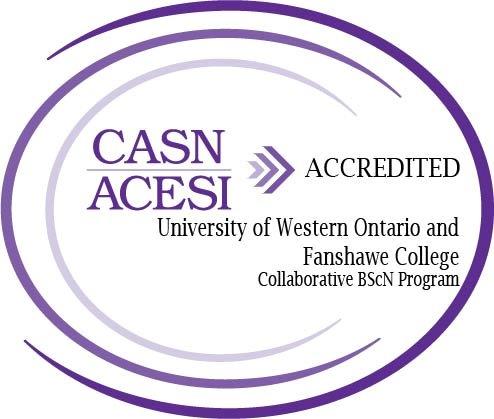
Program Overview
Program Details
Canadian Students
Full Time Offerings
International Students
Full Time Offerings
Your Learning Experience
The Collaborative Nursing program is an accredited four-year degree between Fanshawe College and Western University, leading to a Bachelor of Science in Nursing Degree (BScN). Graduates are eligible to apply for registration as a registered nurse with the College of Nurses of Ontario.
You’ll study for two years at Fanshawe and two at Western University learning from experienced nurses who have worked in busy emergency rooms and doctor’s offices; professionals who know the ropes and are eager to pass on their knowledge.
You’ll learn by working collaboratively and cooperatively with faculty in a state-of-the-art clinical education suite. This program also utilizes simulation learning. Learn more about our simulation labs.
You’ll complete a 12-week clinical placement in your final term where you’ll partner with a registered nurse in one of London's exceptional health care facilities.
The curriculum emphasizes a broad perspective of health and healing, health promotion and the ethic of caring. It takes into account health care needs in society and a changing health care system. The program educates nurses to work with individuals, families, groups and communities in diverse settings, enabling students to develop sensitivity to peoples' diverse experiences with health, healing and illness. Students learn to work in partnership with clients and inter-professional health care providers, while actively participating in their own learning.
When you graduate, you’ll be eligible to write the National Council Licensure Examination for Registered Nurses (NCLEX-RN) – the entry-to-practice to become registered with the College of Nurses of Ontario –giving you the ability to work in a healthcare facility anywhere in the province.
For admission questions, please book an appointment with the Collaborative Nursing advisor at Western.

The School of Nursing is fully accredited by the Canadian Association of Schools of Nursing.
Career Information
Graduates of Fanshawe's Collaborative Nursing program are prepared for a variety of positions in the healthcare industry. Pursue the path of working as a registered nurse in a variety of different industries or within a public hospital. Explore other opportunities available with a nursing degree such as a travel nurse, flight nurse, school nurse, or more.
Did you know Fanshawe consistently ranks high in graduate employment rates among large colleges in Ontario?
Here are some examples of career opportunities for graduates of Fanshawe’s Collaborative Nursing program:
Nurse Educator
Work as a staff development educator in a clinical environment, or as a professor or faculty member at a university or college.
Registered Nurse
Ensure resident care is provided with established nursing standards and principles, physicians’ orders’, and administrative policies.
Forensic Nurse
Care for victims of crime and play a crucial role in gathering medical evidence and providing expert testimony that can be used in court.
Train in a Realistic Emergency
Every year, Fanshawe holds an emergency preparedness exercise at its London Campus that simulates realistic emergencies to help test and train students and campus emergency first responders. The College is one of the only post-secondary institutions to provide experiential learning of this type, on this scale. Students in this program have the opportunity to participate in this exciting event.
Academic School
Program Coordinator:
Year 1 and 2:
Anne A. Lamesse, RN, BScN, MScN
Admission Requirements
Please visit our collaborative partner's site for full details: https://www.uwo.ca/fhs/nursing/undergrad/bscn/admission.html
Ontario Secondary School Diploma (OSSD), or equivalent, with a minimum grade of 70% in each of the following courses
- Grade 12 English (U)
- Grade 12 Biology (U)
- Grade 12 Chemistry (U)
- Grade 11 Functions (U) OR Grade 11 Functions and Applications (M) - Minimum grade of 75% required
- Three additional Grade 12 University (U of M) courses
- SUPPLEMENTAL MATERIAL REQUIRED: Computer-Based Assessment for Sampling Personal Characteristics Test (CASPer), see fanshawec.ca/casper for details.
Pathways to admission for students not currently in high school
1. Pre-Health Sciences Pathway to Advanced Diplomas and Degrees
2. General Arts and Science Ontario College Certificate
3. Other post-secondary graduates
4. Mature Students
Pre-Health Sciences Pathway to Advanced Diplomas and Degrees Ontario College Certificate
Applicants who graduate from this program will need a with a minimum GPA of 2.5 and a minimum 70% (C+) in each of the following Pre-Health courses:
- COMM-3050
- BIOL-1003 and BIOL-1008
-CHEM-1004 and CHEM-1006
-MATH-1024 or MATH-1028
Fanshawe College General Arts and Science Ontario College Certificate
Applicants who graduate from this program will need a with a minimum GPA of 2.5 and a minimum 65% (C+) in each of the following General Arts and Science courses:
- COMM-3073
- BIOL-3012 and BIOL-3013
- CHEM-3014 and CHEM-3015
- MATH-3079 OR MATH-3080
Other post-secondary graduates
- Applicants from other acceptable programs at a college must have achieved an overall GPA of 2.5 in an acceptable completed program, and the prerequisite courses listed above with a minimum grade of 70%
- Applicants from a university must maintain a minimum average of 70.0% on the last ten full credit or full credit equivalent courses and the prerequisite courses listed above with a minimum grade of 70%
Mature Applicants:
Please see our partner's website: http://welcome.uwo.ca/preview/admissions/mature.html
Notes:
- CASPer is a mandatory requirement for all applicants regardless of education background, with no exceptions. Please check out CASPer webpage for more details.
- This is a highly competitive program and applicants should strive to achieve an overall average in the low 90s (if in high school) and high 80s (if in post-secondary)
- The minimum grade for each required course will be 75% for fall 2025 applicants
Competitive Programs
| *Important Note: Applicants wishing to enroll in Western University and Fanshawe College's Collaborative Nursing program at the Fanshawe College site must apply through the Ontario Universities' Application Centre at www.ouac.on.ca. |
International Admission Equivalencies
English Language Requirements
English Language Requirements
Applicants whose first language is not English will be required to demonstrate proficiency in English by one of the following methods:
- A Grade 12 University Stream English credit (or equivalent) with at least four recent years of full-time study in an educational institution where the language of instruction and of examinations was English and which was located in a country where the first language is English
- Test of English as a Foreign Language (TOEFL) test with a minimum score of 92 for the Internet-based test (iBT) (22 writing, 26 speaking, 20 reading and 20 listening), with test results within the last two years
- International English Language Testing System (IELTS) Academic test with an overall score of 7.0 with no score less than 6.5 in reading and listening and a score of 7.0 in writing and speaking, with test results within the last two years
Applicant Selection Criteria
Applicant Selection Criteria
Where the number of eligible applicants exceeds the available spaces in the program, the Applicant Selection Criteria will be:- Preference for Permanent Residents of Ontario
- Receipt of Application by February 15th
- Achievement in the Admission Requirements
- Achievement in Post-Secondary Studies (if applicable)
- *All students applying to the Western-Fanshawe Collaborative BScN program do so through the Ontario Universities' Application Centre (OUAC), choosing program code "ENW" for Western and "ENF" for Fanshawe College. Students are encouraged to apply to both Western and Fanshawe where applicable.
- **Admission to the Fanshawe College Pre-Health Sciences Pathway to Advanced Diplomas and Degrees program or the General Arts and Science program does not guarantee admission in a subsequent year to the Collaborative Nursing program. Successful completion of the Fanshawe College Pre-Health Sciences Pathway to Advanced Diplomas and Degrees program or the General Arts and Science program, however, does enable the student who lacks the requirements from secondary school, to be given consideration when applying to the Collaborative Nursing program. Students who are currently registered in the Fanshawe College Pre-Health Sciences Pathway to Advanced Diplomas and Degrees program or the Fanshawe College General Arts and Science program must successfully complete their certificate with a minimum overall average of 'C+' (2.5 cumulative GPA) by April 30, 2023, and meet the academic prerequisite courses and grades for the Collaborative Nursing program in order to be eligible for admission consideration in the immediately following academic year to the Collaborative Nursing program. Applicants from another Ontario College of Applied Arts and Technology program must have the stated secondary school requirements in order to be considered for admission
- Applicants from other provinces in Canada are eligible to apply for admission on the basis of senior matriculation if their academic records meet, on subject matter and standing obtained, both the admission requirements of the Collaborative Nursing program and the admission requirements of a recognized university in their own province. This must include the successful completion of (university preparation) courses in English, Biology, Chemistry and Mathematics (comparable to Ontario Grade 11 Functions (U) or Grade 11 Functions and Applications (M)) with a minimum final grade required in each course of 65%
Post-Admission Requirements
Post-Admission Requirements
- Possession of a Standard First Aid course certificate (either St. John Ambulance or Canadian Red Cross or equivalent) and a Basic Rescuer course certificate - Basic Life Support (BLS) for Health Care Providers (HCP) in accordance with the Heart and Stroke Foundation of Canada Canadian Guidelines for CPR
- Evidence of Good Health (including immunizations)
- Police Vulnerable Sector Check (PVSC), including a check of the Pardoned Sexual Offenders Database
- Guide to Completing your Professional Practice Requirements
- Pre-Placement Process
- Year 1: Professional Practice Health Form
- Year 2: Professional Practice Health Form
- Placement Agreement
Courses
Group 1 | ||||
| NRSG-7105 | N1040A/B Foundational Concepts Prof NRS | 3 | ||
N1040 Foundational Concepts of Professional Nursing Practices: Students critically examine the historical development of nursing and the framework for Registered Nursing practice, including the philosophical, theoretical, and ethical tenets of the role. Using a variety of theories and conceptual frameworks, students acquire an understanding of how individual values, beliefs, perceptions, and experiences influence perspectives and nursing practice. | ||||
| NRSG-7106 | N1050A/B Academic Prof. Strategies NRSG | 3 | ||
N1050A/B ACADEMIC AND PROFESSIONAL STRATEGIES FOR SUCCESS IN NURSING: Students will acquire strategies to transition into the university and the BScN program which will help them acquire the foundational skills necessary to succeed both academically and in professional nursing practice. | ||||
| NRSG-7107 | N1120A/B Community Care Models of Prac | 3 | ||
N1120 Community Care Models of Practice: Students critically examine models of care and sources of knowledge in community nursing practice including public health, community home health and primary healthcare. Applying principles of primary healthcare, social justice, and equity students critique how policy, practice, culture and societal norms impact health of the individual, family, community and population. | ||||
| NRSG-7108 | N1190A/B Enact Social Justice & Equity | 3 | ||
N1190 Enacting Social Justice and Equity in Nursing Practice: Introduction to social determinants of health, social justice and health equity are foundational components in this course. Impacts of policy, politics, power, and privilege are investigated to understand how nursing and the current healthcare system have created historic inequities that continue to disadvantage and marginalize specific populations. The impact of colonizing practices is threaded throughout the course | ||||
| NRSG-7115 | N1140a/B Int. to Hlth Informatics in Nsg | 3 | ||
This course will extend students' knowledge and skills related to information literacy and knowledge acquisition skills necessary for professional nursing practice. From a health equity lens, students will recognize how current trends in technology interface with clients' access to health in a digital space. Through active learning, students will examine appropriate knowledge sources for nursing practice. | ||||
Tuition Summary
London (Fanshawe Costs)
*Total program costs are approximate, subject to change and do not include the health and dental plan fee, bus pass fee or program general expenses.





